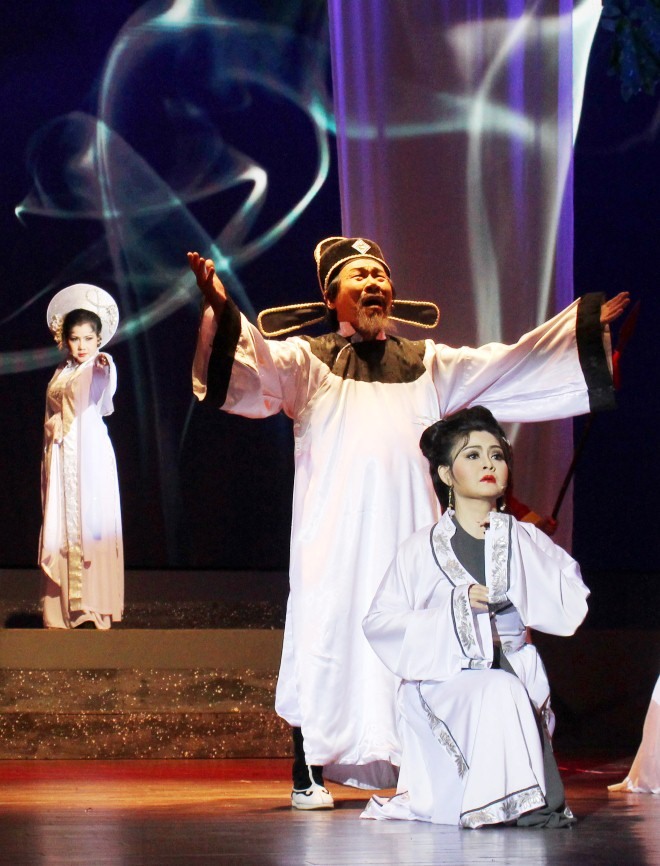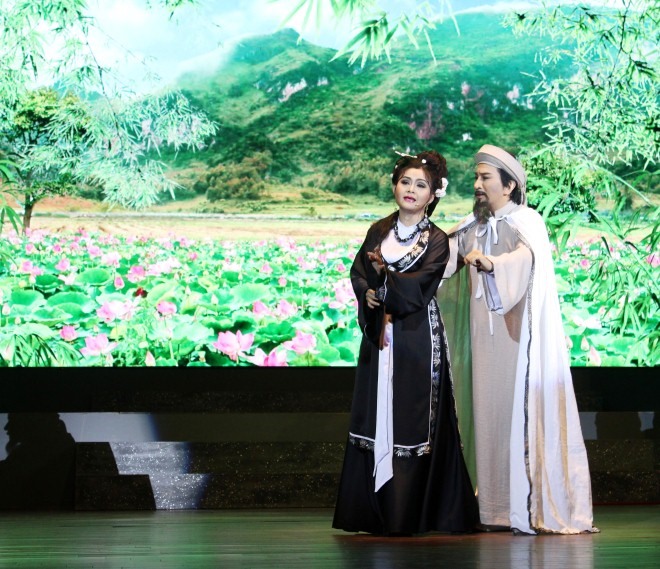[ad_1]

|
| Nearly 1,000 people at Long An Cải Lương Theatre enjoyed young actors in Rạng Ngọc Côn Sơn, a historical play revolving around the unjust death of national hero Nguyễn Trãi, one of Việt Nam’s greatest politicians and poets. —Photo courtesy of the producer |
By Thu Anh
HCM CITY – For his latest cải lương (reformed opera) production, Rạng Ngọc Côn Sơn (Pearl in Côn Sơn), director and Meritorious Artist Kim Tử Long simplified the set and costume design, and retained the authentic words used by Vietnamese centuries ago.
The result: tickets for the next three weeks have sold out in HCM City.
On opening night last week at the National Cải Lương Festival in Long An Province, nearly 1,000 people at the Long An Cải Lương Theatre enjoyed the play, whose theme revolves around the unjust death of national hero Nguyễn Trãi, one of Việt Nam’s greatest politicians and poets.
The two-hour tragedy, staged by the Kim Tử Long Entertainment Company, left a strong impression on theatregoers, a clear indication that people are ready for quality and innovative plays.
“I believe that cải lương will be alive if actors like Long and his staff are involved,” said Trần Thị Sửu, 25, a resident of Long An’s Tân An City.
“Although I really like cinema and musical performances, I’m willing to get a taste of what cải lương is like,” said Sửu, who took her parents to the first performance of Rạng Ngọc Côn Sơn.
Sửu also said that historical plays contain lessons that help “youth learn more about the country’s traditional culture and lifestyle,” she said.
New story
Since its debut by the Trần Hữu Trang Theatre of HCM City in 1980, Rạng Ngọc Côn Sơn has been restaged several times.
This performance is targeted to young audiences.
Director Long invested several hundred million đồng on high-tech equipment, including light and sound effects, artificial smoke and visual arts.
“Hero Nguyễn Trãi is popular among the Vietnamese people. We have tried our best to portray the hero and his career on stage as realistically as possible,” said Long, who has more than 30 years in the industry, and is owner of Kim Tử Long Entertainment Company.
To highlight the play’s theme, he also asked costume designers to use the same colours popular during the time when Trãi lived.
“I wanted to perfect the stage of cải lương to attract both older and younger generations,” he said.
Long’s play, based on a script by well-known playwright Xuân Phong, portrays the circumstances of Trãi’s death, which resulted from a secret involving the death of King Lê Thái Tông.
The production includes scenes in early 1442 when King Tông decides to visit Trãi’s family.
The king meets Trãi’s young wife, Nguyễn Thị Lộ, a native of Thái Bình Province, who was known for her great learning.
He decides to sleep at the manor Lệ Chi, owned by Trãi’s family, and that night, he suddenly becomes ill and dies.
The court later blames Trãi and his wife for the king’s death, accusing them of treason. Trãi and Lộ, and members of three generations of both of their families, are then executed.
Twenty years later, King Lê Thánh Tông officially pardons Trãi, declaring that the great scholar was innocent in the death of the late King Lê Thái Tông.
Long said he and the rest of the actors faced many challenges staging the historical drama, which features the tragic life and death of Trãi and his wife.
“I was very careful selecting the actors,” said Long, who plays the role of Trãi.
“Trãi’s wife is famous for her beauty and learning. Her love, respect and faithfulness to Trãi leave a strong impression on different generations, so the biggest challenge is how your young actress expressses her spirit.”

|
| Meritorious Artist Kim Tử Long and young actress Trinh Trinh perform in Rạng Ngọc Côn Sơn, a historical play staged as part of the 14-day National Cải Lương Festival in Long An Province, which opened on September 5.—Photo courtesy of the producer. |
In the title role of Trãi’s wife, young actress Trinh Trinh, who is often seen in romantic roles, has had to refine her acting skills to successfully portray the famed woman.
“I improved my acting by working with my teachers and older colleagues like Long and Meritorious Artist Phượng Loan,” Trinh said. “I show that young actors can take serious roles.”
The remaining shows of Rạng Ngọc Côn Sơn will begin at 8pm at Bến Thành Theatre, 6 Mạc Đĩnh Chi Street, in District 1 on Saturday and Sunday.
Familiar figure
Generations of Vietnamese students have studied the writings and poetry of Nguyễn Trãi, originally written in both Hán (classical Chinese) and Nôm (classic Vietnamese) scripts.
Among the most famous of his works are Bình Ngô Đại Cáo (A Great Proclamation upon the Pacification of the Wu or the Chinese Ming Dynasty) and Quốc Âm Thi Tập (Collection of Poems in the National Language).
Born in 1380 in Thăng Long (the first official name of Hà Nội), Trãi, also known as Ức Trai, joined the insurgent Lam Sơn army led by King Lê Lợi in 1416 to fight against the Ming and played a critical role in the victory of Lê Lợi’s army. After the war, he held a high rank in the new court.
After King Lê Lợi’s death in 1433, the young heir Lê Thái Tông, however, did not trust Trãi, who was known for fighting against corrupt officials and sycophantic courtiers.
Trãi then decided to retire to the Côn Sơn region’s northern province of Hải Dương in Chí Linh District, spending his time writing.— VNS
[ad_2]
Source link